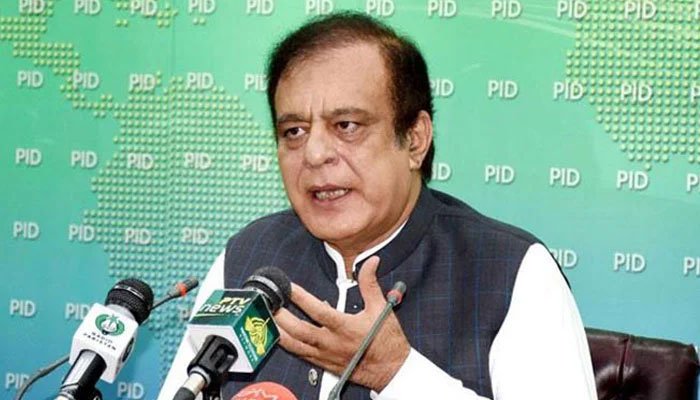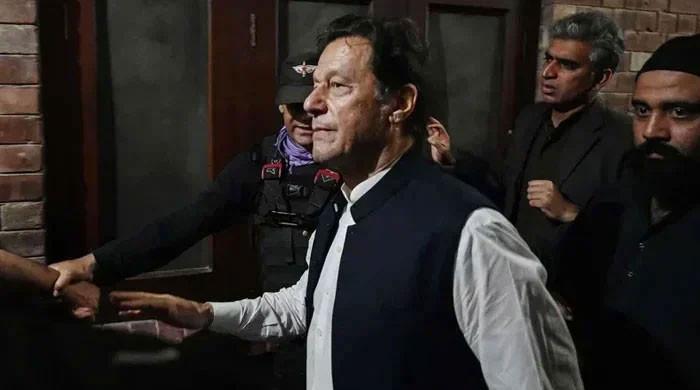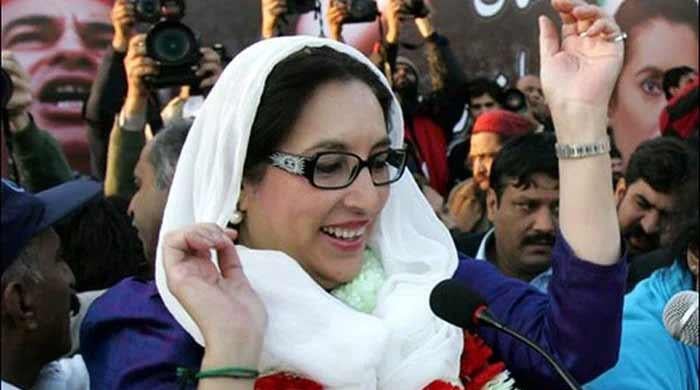Electronic voting will allow over 7 million overseas Pakistanis to vote: Shibli Faraz
Minister says free and transparent elections are only possible with electronic voting machines (EVMs)
June 02, 2021

- Shibli Faraz says electronic voting will enable over 7 million overseas Pakistanis to cast votes.
- Says free and transparent elections are only possible with electronic voting machines.
- Says law has been promulgated authorising and binding the ECP to procure EVMs as well as enabling overseas Pakistanis to exercise their right to vote.
PESHAWAR: Federal Minister for Science and Technology Shibli Faraz on Wednesday said that the introduction of electronic voting in Pakistan will eliminate manipulation, adding that the system will enable more than seven million overseas Pakistanis to cast their votes.
Speaking during a press conference in Peshawar, the minister said that free and transparent elections are only possible with electronic voting machines (EVMs), therefore, the Election Commission of Pakistan (ECP) has to accept it.
Shibli added that Prime Minister Imran Khan strongly desires free, fair, transparent, and credible elections in the country and that was why Electronic Voting Machines was introduced so that overseas Pakistan could be given the right of votes, thus enabling them to participate in the country’s decision-making processes and ensuring rigging-free polls.
The minister also said that a law has been promulgated authorising and binding the ECP to procure EVMs as well as enabling overseas Pakistanis to exercise their right to vote while staying in their country of residence in the next general elections.
To discourage horse-trading and massive use of the money during elections, Shibli said that the government had offered the Opposition to conduct the last Senate elections through a show of hands instead of secret balloting, but the move was rejected due to the Opposition's "ill intension."
ECP eyes meeting with political parties
The Election Commission of Pakistan (ECP) said Wednesday it would soon call a meeting of political parties to discuss and take them into confidence with regards to the use of technology in elections.
The ECP, in a statement, said a meeting between the body and the Ministry of Science and Technology was held today, where the latter was scheduled to display a prototype of the electronic voting machine (EVM).
However, the ministry has sought more time and said the final works on the machine would conclude by the third week of July, and after that, it would be handed over to the ECP.
The ECP told the ministry that it appreciates its help, but it would also take relevant stakeholders — the people and political parties — on board before it transitions towards electronic voting.
In a separate meeting, the secretary and officials of the science ministry and representatives from a Spanish consultancy firm gave a briefing to ECP officials on NADRA's internet voting system.
The meeting compared NADRA's internet voting system to France, Estonia, and Mexico. The meeting was informed that France had stopped using the i-voting system, while Estonia and Mexico were still using it.
The consultancy firm informed ECP officials that NADRA's system was not up to the mark and recommended technological changes to it.
Later, the chief election commissioner summoned a meeting next week to deliberate over the detailed report provided to the ECP by the Spanish consultancy firm.
PDM rejects EVM
The statement comes after the Pakistan Democratic Movement (PDM), last month, had said it rejected the government's "one-sided" electoral reforms, which include the use of electronic voting machines (EVMs), and announced a fresh wave of anti-government protests.
"PDM rejects the government's unilateral electoral reforms ordinance, including the voting machines, and terms it as pre-poll rigging," PDM chief Maulana Fazlur Rehman said, as he addressed a press conference alongside PDM leaders.
In this regard, the Election Commission of Pakistan — which is responsible for holding transparent elections — should call a meeting of all political parties to take a unanimous decision on reforms, he said.









